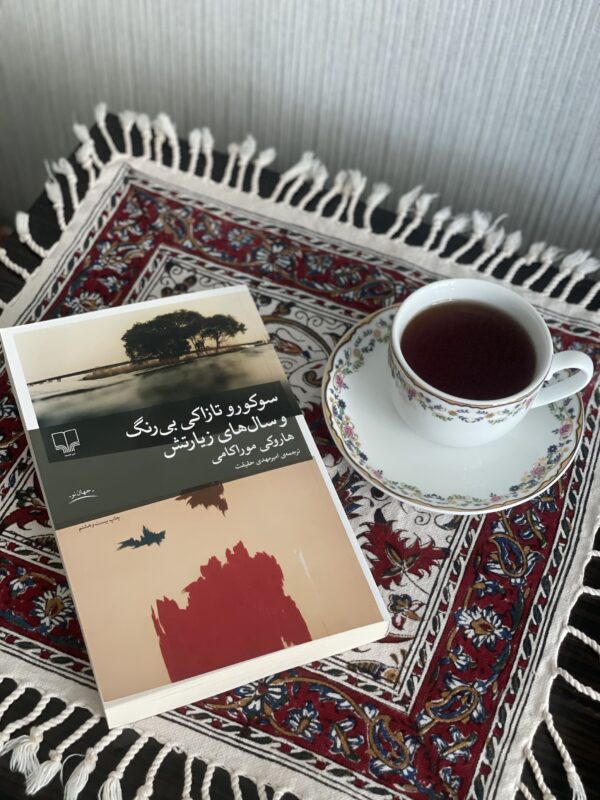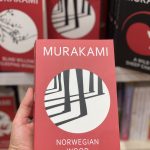
" Colorless Tsukuru Tazaki and His Years of Pilgrimage (Part two) "
Characters in Murakami’s works, like Tsukuru Tazaki, Toru Watanabe in “Norwegian Wood,” and even to some extent Kafka, have unique qualities that make them beloved by me and others. All three characters have a routine of exercise, health, nutrition, reading, and hygiene. They are all well-educated and committed to meticulous and proper work. Despite having financial means, they do not have a greed for having more, eating more, traveling more, seeing more, or wanting more in general. They are content with a simple, unpretentious, quiet, and minimalistic life. They are not particularly adventurous, nor are they inclined to see unseen places or visit unexplored areas. They don’t have an insatiable curiosity for discovery and exploration. They often pursue their genuine desires without pretense, regardless of how much these desires are accepted or approved by society and family, or how impressive they may seem (like Tsukuru’s dream of building train stations). All of them have a lot of free and unoccupied time. They are usually kind, compassionate, and caring individuals who are willing to help others. Despite often feeling empty or lacking something themselves, others find them likable and are drawn to them.
“He thought maybe I really am nothing more than an empty and insignificant person. But perhaps precisely because there was nothing in me, these people had found a place where they could feel a sense of belonging, even if just for a short time. “Like a moth seeking a safe place to rest in an empty attic room, birds like this dim and quiet emptiness. If that were the case, then perhaps he should be happy that he is empty.”
Ari said, “Let’s assume that you really are an empty vessel. So what? What’s the problem with that? After all, you’re still an extraordinary and attractive vessel. Besides, who knows what ’empty’ really means? So why not be a very beautiful vessel? One of those vessels that people feel good about, the kind they want to put their precious things into.”
I agree with Ari, or Kuro. Often, this emptiness is the best state a person can be in. Sometimes, one simply desires that empty vessel and a quiet place where they can flow in silence and stillness. This is what I love about Murakami’s characters. Being generous and giving doesn’t always come from being full. Sometimes, being too full can overflow into places where it shouldn’t and contaminate everything. When your being is full of things to hear and grasp, you crave a giving hand that can offer you emptiness. A space that is empty, where you can pause and find calm. Such people who generously offer the emptiness of their being are rare. It is alongside these individuals that you find your wings. These empty people give you the space and security to spread your wings and fly, to soar with peace of mind.
“Well, the world needs a few people to create emptiness.”
These empty people serve the role of a train station in one’s life.
Tsukuru replied,
“I build stations. Train stations. Not TV stations or things like that.”
“Why train stations?”
Tsukuru said, “Because the world needs train stations.”
“I had never thought about the world needing train stations.”
“But I guess you use stations too. When you’re on a train, you’d be in trouble without a station.”
“Yeah, I ride trains, and I get what you’re saying… It’s just that I never thought there were people in this world whose passion was to build train stations.”
Empty people are the ones you can stop beside during the journey of life. If they aren’t along the way, you’re in trouble; You’d have to travel the entire journey nonstop, without a chance to pause, rest, assess the path you’ve taken, or decide whether to continue or change course. Without a station to disembark at, and perhaps in the stillness and silence of that stop, find an opportunity to change direction and destination, life becomes difficult, monotonous, and sometimes encounters dead ends.
Empty people have a love for being others’ stations, where they can offer themselves—their most valuable asset— a place of rest and solace.
سوکورو تازاکی بیرنگ و سالهای زیارتش (بخش دوم)
شخصیتهای مواراکامی مثل همین سوکورو تازاکی، تورو واتانابه در جنگل نروژی و یا حتا تا حدودی کافکا، ویژگیهای خاصی دارند که نهتنها محبوب من که برای دیگران هم دوستداشتنی هستند. هر سه دارای روتین منظم ورزشی، سلامت، تغذیه، مطالعه و بهداشت هستند. همگی باسواد و اهل کار دقیق و درستند. باوجود تمکن مالی، برای بیشتر داشتن، بیشتر خوردن، بیشتر گشتن، بیشتر دیدن و در کل، برای بیشتر خواستن حرص و طمعی ندارند و اصولن به یک زندگی ساده، بیآلایش، خلوت و خالی اکتفا میکنند. اهل ماجراجویی، دیدن جاهای ندیده و رفتن به جاهای نرفته، کشف و پیدا کردن، و در یک کلام، دارای کنجکاوی سیریناپذیری نیستند. غالبن به دنبال خواسته و علاقه اصلی و واقعی خود، بینقاب و فارق از اینکه چقدر موردپسند و تایید جامعه و خانواده یا بهعبارتی، دهن پرکن هست، میروند (مثل دنبال کردن آرزوی ساخت ایستگاه قطار در سوکورو)؛ و همهاشان وقت آزاد و خالیِ زیادی دارند. معمولن انسانهای بامحبت، مهربان و دلسوزی برای بقیه و اهل کمک هستند و بقیه دوستشان دارند با اینکه از نظر خودشان خالی هستند و چیزی برای ارائه به دیگران ندارند.
“فکر کرد شاید من راستیراستی هم چیزی نیستم جز ادمی توخالی و بیاهمیت. ولی شاید دقیقن چون توی من هیچ چیزی نبوده، این ادمها، شده حتی برای مدّتی کوتاه، جایی را در آن پیدا کردهبودند که بهش احساس تعلق کنند. مثل شبپرهای که به دنبال جای امنی برای استراحت به اتاق خالی زیرشیروانی پناه میآورد. پرندهها این جای خالی کمنور و ساکت را دوست دارند. اگر اینطوری بود، پس شاید او هم بایست خوشحال میبود از اینکه تو خالی است.”
“اری گفت: اصلن فرض کنیم که تو واقعن هم یک ظرف خالی هستی. خب، که چی؟ ایرادش کجاست؟ بههرحال، هنوز هم یک ظرف فوقالعاده و جذابی. در ضمن، اصلن به من بگو کی میداند کی هست؟ پس چرا یک ظرف خیلی قشنگ نباشیم؟ از آن ظرفهایی که آدمها احساس خوبی بهشان دارند، از آن ظرفهایی که آدمها دلشان میخواهد چیزهای قیمتیشان را در آنها بگذارند.”
من هم با اری یا همان کورو موافقم. خیلی وقتها همین خالی بودن بهترین حالتی است که انسان میتواند داشتهباشد. آدم گاهی اوقات دلش همین ظرف خالی و جای دنج را میخواهد. جایی که در آن، در سکوت و سکون جاری باشد. من همین ویژگی شخصیتهای موراکامی را دوست دارم. قرار نیست همیشه بخشنده و دهنده بودن از پُری حاصل شود. گاهی زیادی پُر بودن سرریز میشود جایی که نباید، و همه جا را آلوده میکند. آنگاه که وجودت مملو از شنیدنیها و گرفتنیهاست، دستِ دهندهای میخواهی که به تو خلاء هدیه کند. فضایی خالی برای توقف و آرام گرفتن. زیاد نیستند این قبیل آدمها که اینچنین باسخاوت ظرف وجودشان را در اختیار انسان قرار میدهند. در کنار این آدمهاست که پَر میگیری. این انسانهای خالی به تو مجال و امنیتِ بال گشودن و پرواز میدهند، پریدن با خیالی آسوده.
“خب، دنیا چند نفر هم لازم دارد که خلاء درست کنند.”
این آدمهای خالی نقش ایستگاه قطار را در زندگی انسان دارند.
“سوکورو جواب داد:
“ایستگاه میسازم. ایستگاه قطار. نه ایستگاه تلویزیونی و از اینجور چیزها.”
“حالا چرا ایستگاه قطار؟”
سوکورو گفت:
“چون دنیا ایستگاه قطار لازم دارد.”
“هیچوقت به ایناش فکر نکردهبودم که دنیا ایستگاه قطار هم لازم دارد.”
“ولی گمانم خودت هم از ایستگاهها استفاده میکنی. وقتی سوار قطاری، اگر ایستگاهی نباشد به دردسر میافتی.”
“آره، من هم قطار سوار میشوم و متوجه حرفت هستم… فقط اینکه خب، هیچوقت فکر نمیکردم آدمهایی توی این دنیا هستند که عشقشان این است که ایستگاه قطار بسازند.”
آدمهای خالی همانهایی هستند که در سفر زندگی میتوانی در کنارشان توقف کنی. اگر آنها در مسیر نباشند به دردسر میافتی؛ ناچاری کل سفر را بدون توقف و یکنفس تا آخر بروی و هیچ فرصتی برای ایستادن، استراحت، برآورد مسیر طیشده و ادامه یا تغییر مسیر نداری. اگر ایستگاهی نباشد تا پیاده شوی و احتمالن در سکون و سکوت این توقف مجالی برای تغییر جهت و مقصد بیابی، زندگی سخت، یکنواخت و گاهی با بنبست مواجه میشود.
آدمهای خالی عشقشان این است که ایستگاه دیگران باشند تا در آن لَختی خود، آن باارزشترین داراییشان، را مسکَن دهند.



